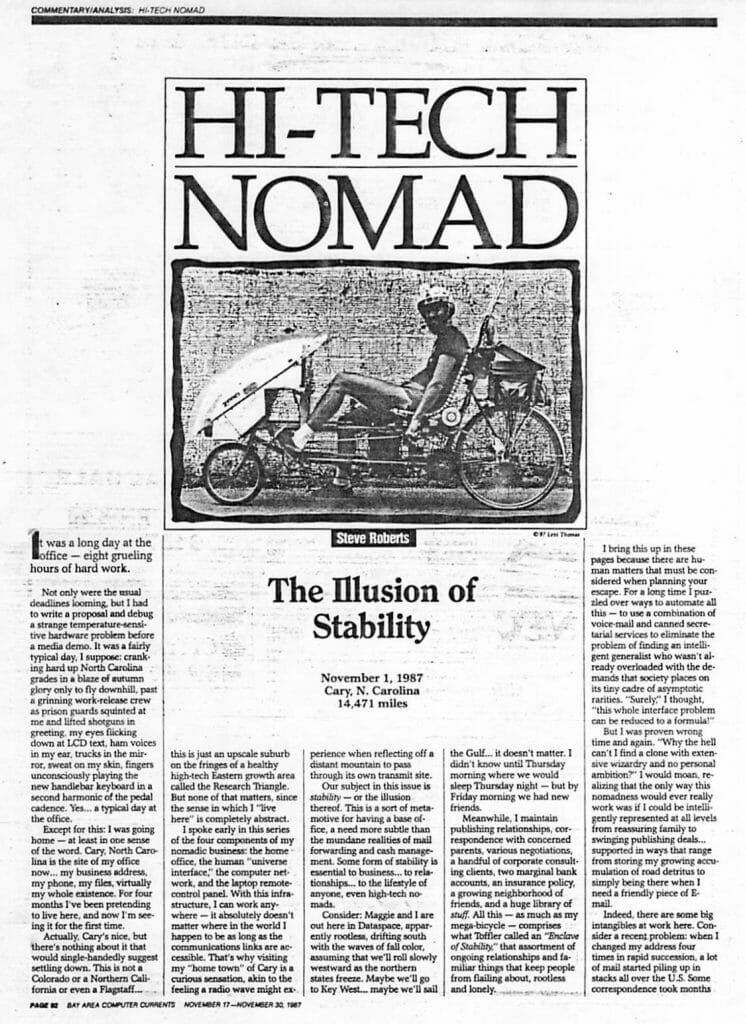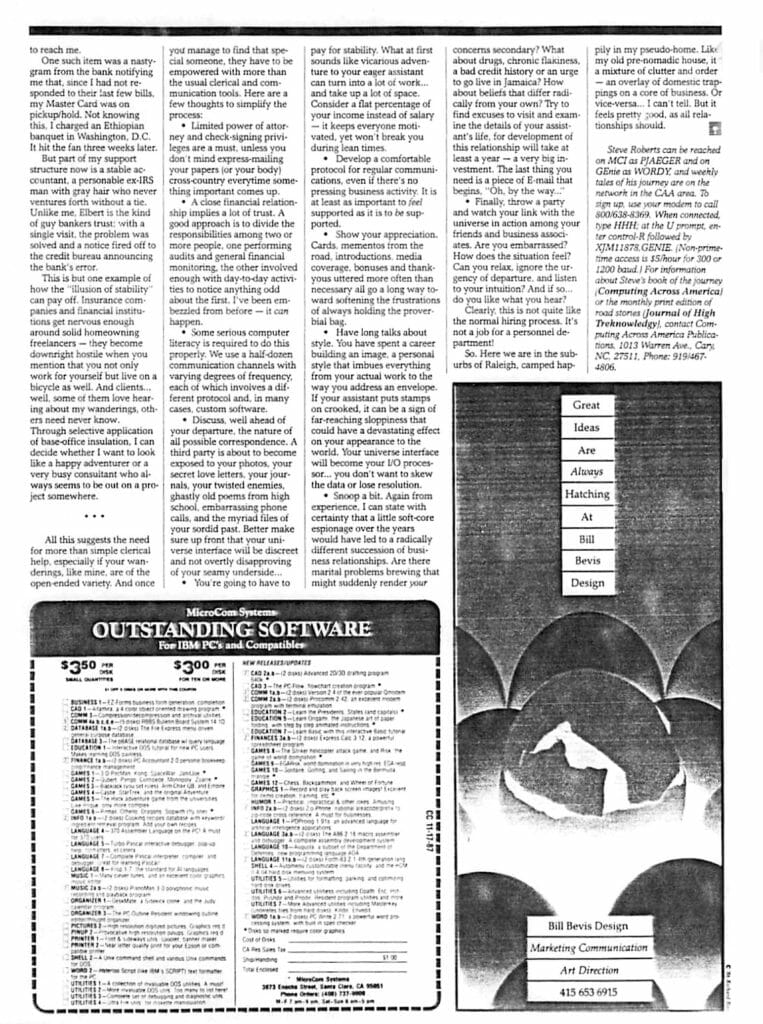
The Illusion of Stability
by Steven K. Roberts
Computer Currents
Cary, North Carolina
November 1, 1987
It was a hard day at the office — eight grueling hours of hard work.
Not only were the usual deadlines looming, but I had to write a proposal and debug a strange temperature-sensitive hardware problem before a media demo. It was a fairly typical day, I suppose: cranking hard up North Carolina grades in a blaze of autumn glory only to fly downhill, past a grinning work-release crew as prison guards squinted at me and lifted shotguns in greeting, my eyes flicking down at LCD text, ham voices in my ear, trucks in the mirror, sweat on my skin, fingers unconsciously playing the new handlebar keyboard in a second harmonic of the pedal cadence. Yes… a typical day at the office.
Except for this: I was going home — at least in one sense of the word. Cary, North Carolina is the site of my office now… my business address, my phone, my files, virtually my whole existence. For four months I’ve been pretending to live here, and now I’m seeing it for the first time.
Actually, Cary’s nice, but there’s nothing about it that would single-handedly suggest settling down. This is not a Colorado or a Northern California or even a Flagstaff—this is just an upscale suburb on the fringes of a healthy high-tech Eastern growth area called the Research Triangle. But none of that matters, since the sense in which I “live here” is completely abstract.
I spoke early in this series of the four components of my nomadic business: the home office, the human “universe interface,” the computer network, and the laptop remote-control panel. With this infrastructure, I can work anywhere — it absolutely doesn’t matter where in the world I happen to be as long as the communications links are accessible. That’s why visiting my “home town” of Cary is a curious sensation, akin to the feeling a radio wave might experience when reflecting off a distant mountain to pass through its own transmit site.

Our subject in this issue is stability — or the illusion thereof. This is a sort of meta-motive for having a base office, a need more subtle than the mundane realities of mail forwarding and cash management. Some form of stability is essential to business… to relationships… to the lifestyle of anyone, even high-tech nomads.
Consider: Maggie and I are out here in Dataspace, apparently rootless, drifting south with the waves of fall color, assuming that we’ll roll slowly westward as the northern states freeze. Maybe we’ll go to Key West… maybe we’ll sail the Gulf… it doesn’t matter. I didn’t know until Thursday morning where we would sleep Thursday night — but by Friday morning we had new friends.
Meanwhile, I maintain publishing relationships, correspondence with concerned parents, various negotiations, a handful of corporate consulting clients, two marginal bank accounts, an insurance policy, a growing neighborhood of friends, and a huge library of stuff. All this — as much as my mega-bicycle — comprises what Toffler called an “Enclave of Stability,” that assortment of ongoing relationships and familiar things that keep people from flailing about, rootless and lonely.
I bring this up in these pages because there are human matters that must be considered when planning your escape. For a long time I puzzled over ways to automate all this — to use a combination of voice-mail and canned secretarial services to eliminate the problem of finding an intelligent generalist who wasn’t already overloaded with the demands that society places on its tiny cadre of asymptotic rarities. “Surely,” I thought, “this whole interface problem can be reduced to a formula!”
But I was proven wrong time and again. “Why the hell can’t I find a clone with extensive wizardry and no personal ambition?” I would moan, realizing that the only way this nomadness would ever really work was if I could be intelligently represented at all levels from reassuring family to swinging publishing deals… supported in ways that range from storing my growing accumulation of road detritus to simply being there when I need a friendly piece of E- mail.
Indeed, there are some big intangibles at work here. Consider a recent problem: when I changed my address four times in rapid succession, a lot of mail started piling up in stacks all over the U.S. Some correspondence took months to reach me.
One such item was a nastygram from the bank notifying me that, since I had not responded to their last few bills, my Master Card was on pickup/hold. Not knowing this. I charged an Ethiopian banquet in Washington, D.C. It hit the fan three weeks later.
But part of my support structure now is a stable accountant, a personable ex-IRS man with gray hair who never ventures forth without a tie. Unlike me, Elbert is the kind of guy bankers trust: with a single visit, the problem was solved and a notice fired off to the credit bureau announcing the bank’s error.
This is but one example of how the “illusion of stability” can pay off. Insurance companies and financial institutions get nervous enough around solid homeowning freelancers — they become downright hostile when you mention that you not only work for yourself but live on a bicycle as well. And clients… well, some of them love hearing about my wanderings; others need never know.

Through selective application of base-office insulation, I can decide whether I want to look like a happy adventurer or a very busy consultant who always seems to be out on a project somewhere.
All this suggests the need for more than simple clerical help, especially if your wanderings, like mine, are of the open-ended variety. And once you manage to find that special someone, they have to be empowered with more than the usual clerical and communication tools. Here are a few thoughts to simplify the process:
- Limited power of attorney and check-signing privileges are a must, unless you don’t mind express-mailing your papers (or your body) cross-country every time something important comes up.
- A close financial relationship implies a lot of trust. A good approach is to divide the responsibilities among two or more people, one performing audits and general financial monitoring, the other involved enough with day-to-day activities to notice anything odd about the first. I’ve been embezzled before — it can happen.
- Some serious computer literacy is required to do this properly. We use a half-dozen communication channels with varying degrees of frequency, each of which involves a different protocol and, in many cases, custom software.
- Discuss, well ahead of your departure, the nature of all possible correspondence. A third party is about to become exposed to your photos, your secret love letters, your journals, your twisted enemies, ghastly old poems from high school, embarrassing phone calls, and the myriad files of your sordid past. Better make sure up front that your universe interface will be discreet and not overtly disapproving of your seamy underside…
- You re going to have to pay for stability. What at first sounds like vicarious adventure to your eager assistant can turn into a lot of work… and take up a lot of space. Consider a flat percentage of your income instead of salary — it keeps everyone motivated, yet won’t break you during lean times.
- Develop a comfortable protocol for regular communications, even if there’s no pressing business activity. It is at least as important to feel supported as it is to be supported.
- Show your appreciation. Cards, mementos from the road, introductions, media coverage, bonuses and thank-yous uttered more often than necessary all go a long way toward softening the frustrations of always holding the proverbial bag.
- Have long talks about style. You have spent a career building an image, a personal style that imbues everything from your actual work to the way you address an envelope. If your assistant puts stamps on crooked, it can be a sign of far-reaching sloppiness that could have a devastating effect on your appearance to the world. Your universe interface will become your I/O processor… you don’t want to skew the data or lose resolution.
- Snoop a bit. Again from experience, I can state with certainty that a little soft-core espionage over the years would have led to a radically different succession of business relationships. Are there marital problems brewing that might suddenly render your concerns secondary? What about drugs, chronic flakiness, a bad credit history, or an urge to go live in Jamaica? How about beliefs that differ radically from your own? Try to find excuses to visit and examine the details of your assistant’s life, for development of this relationship will take at least a year — a very big investment. The last thing you need is a piece of E-mail that begins, “Oh, by the way…”
- Finally, throw a party and watch your link with the universe in action among your friends and business associates. Are you embarrassed? How does the situation feel? Can you relax, ignore the urgency of departure, and listen to your intuition? And if so… do you like what you hear?
Clearly, this is not quite like the normal hiring process. It’s not a job for a personnel department!
So. Here we are in the suburbs of Raleigh, camped happily in my pseudo-home. Like my old pre-nomadic house, it is a mixture of clutter and order — an overlay of domestic trappings on a core of business. Or vice-versa… I can’t tell. But it feels pretty good, as all relationships should.


You must be logged in to post a comment.